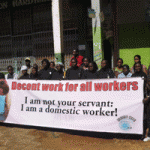Employers in Kenya now must abide by the verbal contracts they make with domestic workers, following a landmark ruling by the nation’s high court that also effectively places domestic workers under Kenya’s employment law. Saying that under the Employment Act, “a verbal contract is a contract that can confer rights and can be enforced,” the judge ruled that domestic workers are covered by the national minimum wage and other provisions of the employment law.
“This court notes that many employers fail to issue their employees with a contract of service and this acts to their detriment as non-issuance of this document leaves the court to interpret the relationship between the parties which could have been well outlined by the mutual agreement of the parties,” Justice Monica Wanjiru Mbaru wrote.
The ruling, which came in December 2012, was apparently unnoticed until it was first reported April 29 in Kenya’s Business Daily. Two days later, the National Social Security Fund (NSSF) warned, through advertisements, that it would enforce the law and that employers who do not obey it face serious consequences. The NSSF said employers are required to register domestic workers and other low-wage employees such as gardeners, and contribute monthly payments to the NSSF to cover workers’ health care and other services.
Meanwhile, Kenya’s newly elected president, Uhuru Kenyatta, on May 1 raised minimum wages by 14 percent.
“The elevated court will serve worker rights as long as the law is followed to the letter,” said Albert Njeru, secretary general of the Kenya Union of Domestic, Hotel, Educational Institutions, Hospitals and Allied Workers (KUDHEIHA). The union, a Solidarity Center partner, has been at the forefront of championing the rights of domestic workers at the national level and working locally to organize workers into the union and educate them about their rights. “The union is very excited with this ruling as it has finally drawn attention to the plight of domestic workers in the country.” He reiterated that “the union will carry on with its campaign to get full rights for domestic workers and ensure their visibility in the labor force.”
KUDHEIHA is pressing the government to pass the International Labor Organization’s Convention 189, Decent Work for Domestic Workers. The groundbreaking convention, passed in 2011, requires nations that ratify it to adhere to standards such as ensuring domestic workers are paid the nation’s minimum wage and have access to health coverage and other social security benefits, including paid leave. Convention 189 recognizes domestic work as any other work and ensures that domestic workers are treated as any other worker under labor legislation.
The Industrial Court ruling came after Robai Musinzi, a domestic worker, sued for wrongful dismissal by her employer, Safdar Mohamed Khan. Musinzi, who had worked for Khan for more than four years under a verbal agreement, won $2,057 after Khan summarily dismissed

